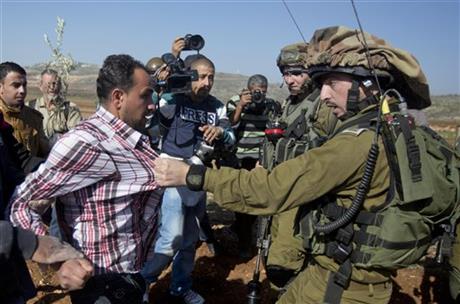
By MOHAMMED DARAGHMEH and MAJDI MOHAMMED
A Palestinian Cabinet member died Wednesday shortly after he and other protesters scuffled with Israeli troops near a West Bank village. The forces also fired tear gas close to the demonstrators, witnesses said.
During the scuffle, a member of Israel’s security forces held Ziad Abu Ain, 55, by the neck. Abu Ain later collapsed, received first aid and died en route to a hospital, witnesses said.
What killed the Palestinian official remains unclear and his body will undergo an autopsy attended by Palestinian, Jordanian and Israeli pathologists, the Israeli army said. But death of Abu Ain, the first Palestinian Cabinet member to die immediately after a protest, likely will enflame simmering tensions that remain after U.S.-brokered peace talks fell apart earlier this year.
Later Wednesday, a 12-year-old Palestinian boy was shot in the head and seriously wounded in a confrontation with Israeli soldiers in the nearby Jalazoun refugee camp, said Ahmed Bitawi, the head of Ramallah Hospital. The Israeli military said it was checking the report.
Palestinian President Mahmoud Abbas was to meet with senior officials from the Palestine Liberation Organization and his Fatah movement later Wednesday to discuss a possible response to Abu Ain’s death. In a statement, Abbas called the death a “barbaric act,” but added that he would wait for the results of the investigation before deciding on a response. He also called for three days of mourning in the Palestinian territories.
Some called for suspending Palestinian security coordination with Israel in the West Bank, but it was not clear if that option would be considered.
In Brussels, EU foreign policy chief Federica Mogherini called for an independent investigation and said that “reports of excessive use of force by Israeli security forces are extremely worrying.”
The U.N. envoy to the region, Robert Serry, appealed for calm and urged Israel to carry out an immediate, transparent investigation.
Wednesday’s events began with a march by several dozen Palestinians who headed to agricultural land near the West Bank village of Turmus Aya to plant olive tree saplings, participants said. The land is close to an unauthorized Israeli settlement outpost, Adei-Ad, one of dozens in the West Bank, and mostly off limits to the village’s farmers, protesters said.
As the marchers walked toward the land, Israeli soldiers fired tear gas and threw stun grenades at the Palestinians, said Kamal Abu Sassaka, an assistant to Abu Ain who said he was by the Cabinet member’s side the entire time.
Abu Ain told an Israeli officer that this was a peaceful protest, but was told the group could not move further, said Abu Sassaka.
He said there was pushing and shoving between marchers and soldiers, and that soldiers fired tear gas toward the legs of the Palestinians.
He said one soldier hit Abu Ain in the chest with his rifle butt. An Associated Press photographer and an Israeli reporter at the scene said they did not see Abu Ain being hit with a rifle butt.
Abu Ain, his face pale, sat the ground after the clash, leaning against a rock and holding his chest. Abu Sassaka said an Israeli soldier administer first aid to Abu Ain before protesters carried him away. An ambulance later took Abu Ain to Ramallah Hospital and he died en route, Abu Sassaka said.
The Israeli military said that about 200 “rioters” gathered in Turmus Aya and that troops prevented them from reaching Adei-Ad, using “riot dispersal means.” That typically means tear gas and stun grenades.
The Israeli military also said it proposed to Palestinian officials that they conduct a joint investigation into Abu Ain’s death.
Earlier Wednesday, the Israeli rights group Yesh Din filed a court appeal, demanding that the Israeli military enforce long-standing orders to dismantle the settlement outpost.
Yesh Din attorney Shlomy Zachary told Israel’s Channel 10 TV that the outpost was established in 2000 and now effectively controls large areas around it, including lands of Turmus Aya, because the military prevents access to villagers for fear of friction with the settlers.
Abu Ain headed a Palestinian Authority department dealing with Israeli settlements and the Israeli separation barrier, and had the rank of Cabinet member. Previously, he served as deputy minister for prisoner affairs.
Abu Ain was a member of Fatah and had spent several years in Israeli prisons. He was arrested in the United States in 1979 and extradited to Israel two years later. There, he was sentenced to life for being a member of a cell that planted a bomb that killed two Israelis. Abu Ain was released in a 1985 prisoner swap.
During the second Palestinian uprising in 2002, he spent a year in administrative detention without trial or charges.
___
Daraghmeh reported from Ramallah, West Bank.



